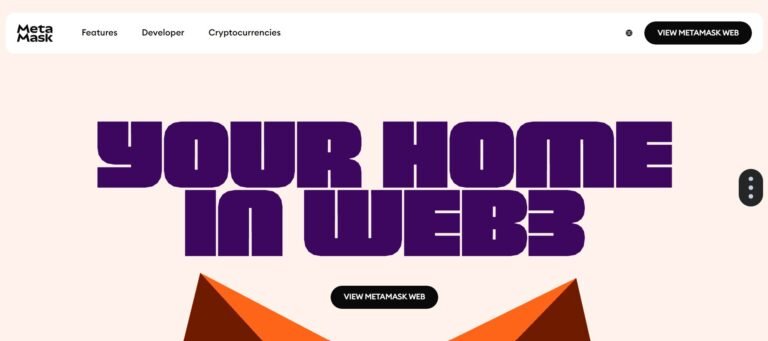Table of Contents
Introduction to MetaMask
This MetaMask review takes a closer look at one of the most popular crypto wallets in the market. MetaMask, developed by ConsenSys and based in the United States, offers a browser extension and mobile app that allows users to store, swap, and interact with decentralized applications (dApps). While its popularity has skyrocketed, many crypto users are questioning its safety and reliability, leading to discussions about a potential MetaMask scam.
This review is especially for two groups: those who have already experienced issues with MetaMask and want answers, and those considering using MetaMask but want to confirm whether it is safe. This MetaMask review uncovers all the warning signs you need to know before using the wallet.
MetaMask: Regulation & Legal Status
Unlike traditional brokers or centralized exchanges, MetaMask operates as a decentralized wallet and does not hold user funds. However, this also means it is not directly regulated by authorities such as the U.S. Securities and Exchange Commission (SEC), the UK’s Financial Conduct Authority (FCA), or the Australian Securities and Investments Commission (ASIC).
While MetaMask has built a reputation as a self-custody wallet, its lack of direct regulatory oversight comes with risks. Fraudsters often target MetaMask users through phishing scams and fake support channels. Similar tactics have been seen in other crypto-related fraud cases. If you want to protect yourself, learn how to spot a scam broker before it’s too late. This lack of formal oversight raises valid concerns for new users and begs the question: Is MetaMask a scam or simply a high-risk tool for managing crypto assets?
Trading Conditions & Platform Analysis of MetaMask
MetaMask provides a non-custodial wallet with access to the Ethereum blockchain and other networks via custom RPC configurations. It allows users to store tokens, connect to decentralized exchanges, and swap assets directly within the app. However, it does not provide traditional trading conditions like leverage, spreads, or brokerage services since it functions purely as a wallet and dApp gateway.
One key concern is that MetaMask users often engage with third-party platforms via the wallet, which may expose them to scams if they do not verify the legitimacy of those platforms. Additionally, MetaMask has been criticized for its high swap fees and lack of transparency regarding slippage during transactions. For users unfamiliar with DeFi, this creates additional risks. Before connecting your wallet to any platform, make sure you understand what to check before signing up with a trading platform. These gaps make it harder to dismiss the possibility of falling victim to fraudulent activities while using MetaMask.
Reputation & User Reviews About MetaMask
MetaMask enjoys strong brand recognition in the crypto community, but not all reviews are positive. On platforms like TrustPilot, users have reported issues with phishing attacks, stolen funds, and lack of direct customer support. Many of these complaints highlight that MetaMask cannot recover stolen assets since users hold their own private keys.
Despite these concerns, MetaMask remains one of the most downloaded crypto wallets globally, with millions of active users. However, the presence of fake reviews and unverifiable testimonials online makes it difficult for newcomers to distinguish between real feedback and promotional content.
How to Test Whether MetaMask Is a Scam
If you’re unsure about MetaMask, here are steps to help assess its legitimacy:
- Check for official sources: Only download MetaMask from its official website or verified app stores.
- Beware of phishing: Never share your seed phrase or private keys with anyone claiming to be MetaMask support.
- Research user complaints: Look up real experiences on forums and review sites.
- Test functionality: Start with a small amount of crypto to see how transactions work.
- Understand wallet risks: Remember that MetaMask is non-custodial, and lost funds cannot be recovered by the company.
- Report fraud: If you’ve been scammed, report it using the FTC’s fraud reporting tool or check the project’s risk profile on ScamDoc.
Final Verdict & Alternatives
MetaMask is not inherently a scam, but it carries inherent risks due to its decentralized nature and lack of regulatory oversight. While it offers unmatched access to DeFi and dApps, users must exercise extreme caution to avoid phishing scams and fraudulent third-party platforms.
If you want a safer experience, consider regulated exchanges and wallets with stronger customer support and insurance protections. Always double-check URLs, secure your seed phrase, and avoid engaging with unverified platforms when using MetaMask.
Ultimately, trading or storing crypto safely requires due diligence and sticking with trusted, regulated providers wherever possible.



